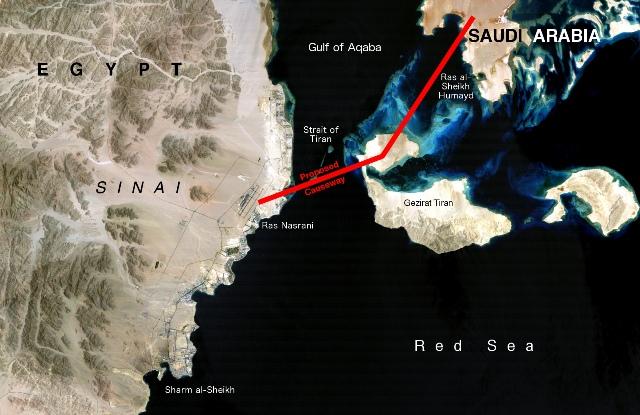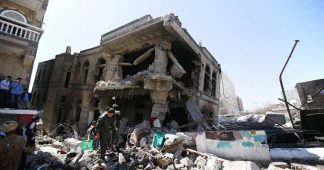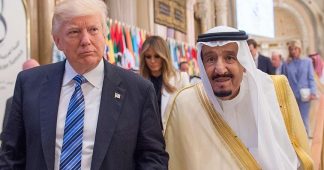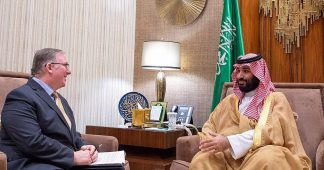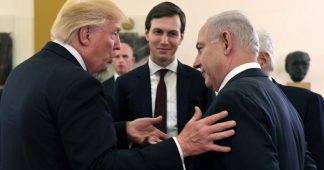Pakistan-Saudi Arabia: Deepening Patron-Client Ties
Pinak Ranjan Chakravarty
New Delhi 17 February 2019
The visit of controversial Saudi Crown Prince Muhammad bin Salman or MbS, as he is popularly known, to Pakistan and India, may irritate those who hate the idea of any hyphenation between India and Pakistan. This should not worry India, though Pakistan will not be comfortable that MbS will be visiting India directly from Islamabad. Saudi Arabia is leveraging the hyphenation and Pakistan can do nothing about it. It will vent its frustration against India by using the only tool it has mastered—terrorism. The murder of Saudi journalist and correspondent of the Washington Post, Jamal Khashoggi, in the Saudi consulate in Istanbul by Saudi agents was a despicable act and the finger was pointed at MbS for ordering the assassination. The Western media revelled in vilifying and denouncing MbS and there was even speculation whether he would survive in his position as Crown Prince. MbS seems to have survived the crisis, as he embarks on his visit to Pakistan and India.
Notwithstanding its economic clout, Saudi Arabia’s military capability is limited, despite having expensive and modern Western weaponry in its inventory. Saudi Arabia is mired in the quagmire of the war in Yemen, where it has little to show for flexing its military muscle against ragtag Yemini militias. The civil war in Yemen rages on, causing enormous humanitarian problems. The main thrust of the visit to Pakistan is to persuade its leadership to play a bigger role in the Islamic Military and Counter Terrorism Coalition [IMCTC]. An unusually large IMCTC delegation, headed by former Pakistani Army Chief General Raheel Sharif, has preceded MbS’ arrival in Islamabad. Raheel Sharif heads the IMCTC and is paid by the Saudis. His task is to do his paymaster’s bidding and increase Pakistani involvement in the IMCTC, is over and above the contingent of Pakistani troops already deployed in Saudi Arabia to “defend Saudi territory”. Around 1.9 million Pakistanis live and work in Saudi Arabia, providing Pakistan with an important source of remittance.
The price for Pakistan’s cooperation is Saudi Arabia’s offer of financial assistance of US $6 billion to bail out Pakistan from its parlous economic situation. Pakistan’s foreign exchange reserves are down to around US $8 billion, just enough for about two months’ imports. Imran Khan undertook his first official visit to Saudi Arabia to plead his country’s case for financial assistance. Pakistani attempts to seek help from the IMF are yet to fructify. MbS will also sign several commercial deals, including one for US $10 billion for a refinery at Gwader port’s economic zone. Pakistan’s other patron China, which manages Gwader port and is building the special economic zone, has not been very forthcoming and has promised only US $2.5 billion for the bailout basket. Pakistan has invited Saudi Arabia to invest in the China Pakistan Economic Corridor [CPEC], funded by China. Pakistan hopes to strengthen its negotiating position with the IMF by using these financial infusions to bolster its forex reserves and the investment economy.
On the trade front, Pakistan will try to engage MbS on a Preferential Trade Agreement, having failed to make any headway in the Free Trade Agreement with the GCC. Pakistan is not a major exporting country with exports hovering around US $25 billion. Bangladesh, a smaller country in size and population exports more than US $40 billion annually. Pakistan’s exports to Saudi Arabia have declined steadily from around US $5 billion in 2013-14 to US $2.5 billion in 2016-17. With Iranian Chabahar port starting operations, trade is bypassing Karachi port, as Afghanistan steadily diverts its import via Chabahar.
Rattled by the siege of Makkah by recalcitrant tribes in 1979, the Saudi royal family sought help from Pakistan to station a division of Pakistani troops to act as the Praetorian Guard in the 1980s. The bilateral military relationship has always been strong though the relationship has been a patron-client one. PM Imran Khan who had vowed that Pakistan will not fight any other country’s war anymore, will find himself between a rock and hard place. Saudi Arabia has long played the role of a patron for Pakistan, providing financial assistance, deferring payment facilities for Saudi oil supplies and even intervening in providing political asylum to Pakistani leaders. Former PM Nawaz Sharif, currently incarcerated for corruption charges, spent 10 years in exile in Saudi Arabia after General Pervez Musharraf ousted Sharif in a military coup. The Saudis had stepped in to broker the asylum deal. Imran Khan will have no wiggle room to deflect Saudi demands. Moreover, it will be the Pakistani army which will decide on this issue concerning Saudi Arabia. As a client state with a serious balance of payment crisis, Pakistan will again become a provider of mercenaries for the Saudis.
Clearly, Saudi Arabia wants to use Pakistan to bolster the IMCTC’s military muscle as it ups the ante in the regional struggle for primacy against Iran. The ostensible reason will be the requirement of training of the growing demands of the IMCTC. This military coalition comprising 41 Muslim countries was set up under a Saudi initiative in 2015 when ISIS was rampaging through Iraq and Syria and threatening Saudi Arabia with terror strikes. Today the ISIS threat is almost over and the IMCTC is in search of a role that seems inchoate.
The day the Jaish-e-Mohammad [JeM]/ISI inspired suicide bomb attack took place at Avantipura in Pulwama district of Jammu and Kashmir, the same day a similar attack was carried out against a convoy of the Iran Revolutionary Guards Corps by the Jaish-al-Adl [JaA], a Sunni terrorist organization that is a successor to the Jundullah. The JaA is fighting the Shia Iranian regime on behalf of the Baloch people in the Sistan-Balochistan province of Iran that abuts Pakistani Balochistan. Both the JeM and the JaA are based in Pakistan where they are funded, trained and nurtured by the Pakistani “deep state”, as an integral part of Pakistan’s state sponsorship of terrorism. Iran has vowed to retaliate and issued a warning that it will avenge the terrorist attack.
The more Pakistan gets sucked into the IMCTC to do the bidding of the Saudis, the greater will be its dilemma in dealing with Iran. These two bombing incidents are extreme provocations and raise questions about the timing, on the eve of MbS’ visit to Pakistan and India and the forthcoming meeting of the FATF next week, where Pakistan is desperately trying to get off the grey list for money laundering for terror funding.
The Pakistani deep state may have reached the conclusion that since it is back in the game with the USA over Afghanistan, it can continue its terrorist attacks against India and Iran. Pakistan has sought to balance the two terrorist attacks, knowing that American displeasure on the India bombing will be set off against American approval for the Iran bombing, given the U.S. bitter adversarial attitude towards Iran and its regime change agenda for that country. MbS’s decision to cut short his visit to Pakistan by a whole day may also hold a message for his hosts that Pakistan ignored Saudi reaction to these bombings, though the Saudis too have a hostile attitude towards Iran. MbS has also postponed his visit to Malaysia and Indonesia. MbS has been “looking East” as part of re-orienting Saudi foreign policy. These decisions may well lead to postponing the visit to Pakistan and India, in an ambience of national outrage in India, over the terrorist attack on the CRPF convoy at Avantipua.
Saudi Arabia’s ties with India are no longer hostage to its ties with Pakistan, much to the latter’s chagrin. The context of the relationship has changed qualitatively, with closer India-Saudi economic and security engagement. MbS’s visit is expected to seal the deal for Saudi investment in the US $44 billion Ratnagiri refinery project. MbS is also looking for international rehabilitation and a visit to India will burnish his credentials. MbS has projected himself as a reformer of medieval Saudi laws. He has permitted women to drive and allowed public screening of movies, banned for decades. India is an important market of Saudi oil and provides economic opportunities that Pakistan cannot match. Saudi relations with India and Pakistan stand largely de-hyphenated. Saudi Arabia too is worried about jihadi terrorism in its neighbourhood [ISIS] and security and defence cooperation with India has intensified based on a common perception of national security. The Modi government’s adroit engagement with the Gulf countries, particularly Saudi Arabia and UAE has been fruitful. This has not prevented India from pursuing its engagement with Iran and Israel. Pakistan’s continuing terrorist attacks muddies the geopolitical situation for the whole region. Pakistan has assumed that it can live with the consequences, since it has enough leverage with its patrons to carry on with this policy. The time has come for India to re-evaluate its policy towards Pakistan.
Published at https://sniwire.com/neighbours/pakistan-saudi-arabia-deepening-patron-client-ties/
